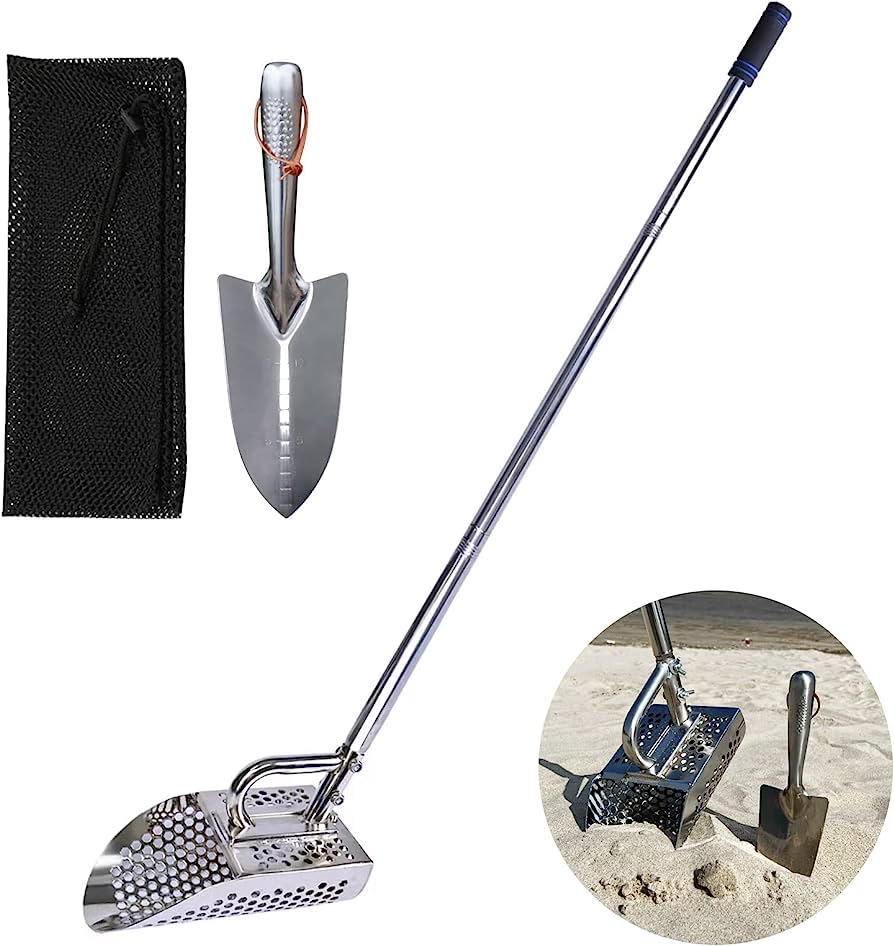A metal detector works by transmitting an electromagnetic field and detecting changes in that field caused by metallic objects. Metal detectors operate by creating an electromagnetic field and then detecting any disturbances in that field caused by metallic objects.
This technology is based on the principle of electromagnetism, where an electrical current produces a magnetic field around it. When a metal detector is turned on, it generates a powerful electromagnetic field that extends into the surrounding area. As the field encounters metallic objects, it induces eddy currents in them, causing a disturbance in the field that can be detected by the detector’s receiver coil.
This alerts the user to the presence of metal. The sensitivity and accuracy of a metal detector depend on factors such as frequency, coil size, and the type of conductor being sought.

Credit: www.sciencenews.org
Understanding Metal Detection
Metal detectors are fascinating devices that have the ability to detect metallic objects hidden within various materials. By using electromagnetic fields, metal detectors are able to identify the presence of metal. These devices work by emitting a magnetic field into the surrounding area.
When the magnetic field comes into contact with metal, it creates eddy currents, which in turn generate a secondary magnetic field. The metal detector then picks up this secondary field and alerts the user with a signal, indicating the presence of metal.
There are various types of metal detectors available, each designed for different purposes. Some common types include beat frequency oscillation detectors, very low frequency detectors, and pulse induction detectors. Each type operates based on a specific principle and is effective for different types of metal detection.
Overall, metal detectors are essential tools in various industries, including archaeology, security, and treasure hunting. Understanding how they work can help us appreciate their importance in our daily lives.
How Do Metal Detectors Work?
Metal detectors work by generating an electromagnetic field that interacts with metallic objects. This field is created by a coil of wire that carries an electric current. When the detector is turned on, the coil produces a magnetic field, which induces an electric current in any nearby metal.
The detector then measures the disturbance in the electromagnetic field caused by the metal object. Once a target is detected, the metal detector gives an indication, usually by sounding an audible alarm or displaying a visual signal. Some metal detectors also have features like discrimination and target identification, which allow users to differentiate between different types of metals and filter out unwanted signals.
By understanding how metal detectors work, users can effectively use them for various purposes such as treasure hunting, security screening, and archaeological excavation.
Metal Detection Technologies
Metal detection technologies, such as very low frequency (vlf), pulse induction (pi), and beat frequency oscillation (bfo), are used in metal detectors. Vlf technology is the most popular and works by transmitting and receiving different frequencies to identify metal objects.
It can differentiate between different types of metals and discriminate against unwanted items. On the other hand, pi technology uses a single coil to send short bursts of pulses into the ground. It then measures the time it takes for the pulse to return, allowing it to detect metal objects at greater depths.
Bfo technology operates by transmitting two different frequencies and detecting the difference between them when a metal object is present. This technology is best suited for beginners as it is simpler and less expensive compared to vlf and pi technologies.
Overall, metal detectors work by utilizing these different technologies to detect and locate metal objects.
Factors Affecting Metal Detection
Metal detectors work by using electromagnetic fields to detect the presence of metal objects. Factors that can affect metal detection include the composition and size of the metal being detected. Different metals have varying levels of electrical conductivity, making them easier or harder to detect.
Similarly, larger metal objects create stronger electromagnetic fields, making them easier to detect compared to smaller objects. Soil mineralization and ground balance also play a role in metal detection. Highly mineralized soil can interfere with the detector’s ability to accurately detect metal objects.
Adjusting the ground balance helps eliminate this interference and improve detection accuracy. Another factor is environmental interference, which can disrupt the electromagnetic signals emitted by the metal detector. This interference can come from power lines, radio signals, or other metal objects nearby.
Taking these factors into consideration when using a metal detector can enhance its effectiveness in locating metal objects. So, whether you’re treasure hunting, exploring archaeological sites, or performing security checks, understanding these factors will help you make the most of your metal detection experience.
Tips For Efficient Metal Detection
Metal detectors work by using electromagnetic fields to detect the presence of metal objects. Proper selection and adjustment of the metal detector are crucial for efficient metal detection. It is important to choose a detector that is suited to the specific requirements of the task at hand.
Additionally, adjusting the sensitivity and discrimination settings can help to filter out unwanted signals. When it comes to searching techniques and sweep patterns, it is advisable to use a systematic approach. This involves moving the detector in a slow and steady manner, with overlapping sweeps to ensure thorough coverage.
Understanding and analyzing the signals is another key aspect of efficient metal detection. Being able to differentiate between different types of signals can help to determine the nature of the object being detected. By following these tips, you can improve your metal detection skills and maximize your chances of success.
Applications And Limitations Of Metal Detectors
Metal detectors work by emitting electromagnetic fields and detecting changes in those fields caused by metallic objects. These devices have various applications and limitations in fields such as archaeology, treasure hunting, security screening, law enforcement, and industrial or construction use.
In archaeology and treasure hunting, metal detectors assist in locating artifacts and hidden treasures buried beneath the surface. Law enforcement and security agencies use metal detectors for screening individuals and baggage to identify concealed weapons or prohibited items. In industrial and construction settings, metal detectors are employed to ensure worker safety by detecting any metallic hazards in the environment.
However, metal detectors do have limitations and challenges. Factors like the depth at which objects are buried, the size and composition of the metal, and the presence of other sources of electromagnetic interference can affect their effectiveness. Overcoming these limitations is an ongoing effort to enhance the accuracy and reliability of metal detection technology.
Maintenance And Care For Metal Detectors
Metal detectors work by utilizing electromagnetic fields to detect metal objects. Maintenance and care are essential to ensure their optimal performance. Cleaning and proper storage are crucial in preventing damage and preserving their functionality. Regularly cleaning the detector’s coils helps remove dirt and debris that can interfere with its scanning abilities.
Additionally, storing the detector in a dry and safe place prevents moisture and corrosion. Battery maintenance is also vital for uninterrupted operation. Regularly checking the battery life and replacing it when necessary ensures consistent power supply. Calibration and servicing should be done on a regular basis to maintain accuracy and effectiveness.
By following these maintenance practices, metal detectors can continue to work efficiently and provide accurate detection results.
Choosing The Right Metal Detector
Metal detectors work by emitting a magnetic field that interacts with any nearby metals. The detector generates an electromagnetic field through a coil, which is then transmitted into the ground. When the electromagnetic field encounters a metal object, it creates an electric current that can be detected by the coil.
This signal is then amplified and processed by the detector, alerting the user to the presence of metal. When choosing a metal detector, it’s important to consider your budget and the purpose for which you’ll be using it. You should also look for certain features and specifications that can enhance your metal detecting experience.
There are several popular brands and models of metal detectors available to choose from, each with their own unique features and capabilities. Research and consider these factors to find the right metal detector for your needs.
Frequently Asked Questions Of How Does A Metal Detector Work
How Does A Metal Detector Work?
A metal detector works by generating a magnetic field when powered on. When this magnetic field encounters metal, it generates an electric current in the metal object, which in turn creates a second magnetic field. The metal detector then detects this secondary magnetic field and alerts the user.
What Are The Parts Of A Metal Detector?
A metal detector consists of several key parts: the control box, search coil, shaft, and headphones. The control box houses the circuitry and controls the detector’s settings. The search coil is the part that emits and receives signals. The shaft connects the control box and search coil, and the headphones provide audio feedback to the user.
Can A Metal Detector Find Any Type Of Metal?
Yes, metal detectors can detect various types of metals, including ferrous metals like iron, non-ferrous metals like gold or silver, and alloys like brass or bronze. However, the sensitivity and detection range for different metals may vary depending on the type of metal detector being used.
How Deep Can A Metal Detector Detect?
The depth at which a metal detector can detect objects depends on several factors, including the size and conductivity of the object, the frequency of the metal detector, and the soil conditions. Generally, metal detectors can detect small objects up to a few inches deep, while larger objects can be detected at greater depths.
Can Metal Detectors Be Used Underwater?
Yes, there are metal detectors specifically designed for underwater use. These detectors are typically waterproof, allowing them to be submerged in shallow water, such as beaches or rivers. However, it’s important to note that not all metal detectors are suitable for underwater use, so it’s essential to choose one that is specifically designed for that purpose.
Are Metal Detectors Safe To Use?
Metal detectors are generally safe to use. They emit low-frequency electromagnetic fields that are considered safe for human exposure. However, it’s important to follow proper safety precautions, such as using headphones if in a crowded area, avoiding sensitive electronic devices, and being aware of any local regulations or restrictions regarding metal detecting.
Conclusion
A metal detector is a powerful tool that operates on the principles of electromagnetism to detect and locate metal objects beneath the ground’s surface. By emitting a magnetic field and then measuring how that field is disrupted by nearby metal objects, metal detectors are able to provide an indication of the presence and approximate location of metal items.
The three main components of a metal detector – the control box, search coil, and shaft – work together to create an efficient and effective detection device. While metal detectors are commonly associated with treasure hunting and security applications, they are also widely used in construction, geology, and archaeology to locate buried artifacts, identify property boundaries, and assess potential underground hazards.
Whether you’re a hobbyist or a professional, understanding how a metal detector works can enhance your metal detecting experience and increase your chances of finding valuable treasures or important historical artifacts.
